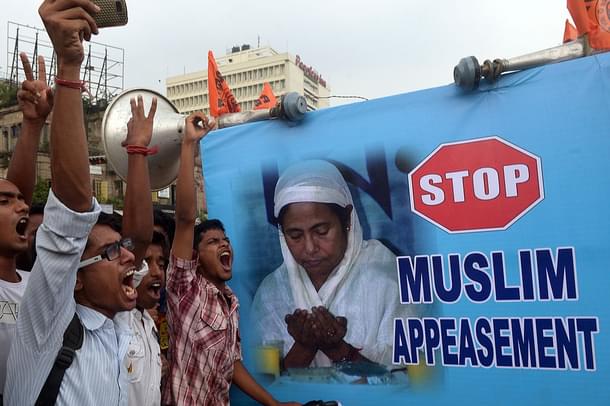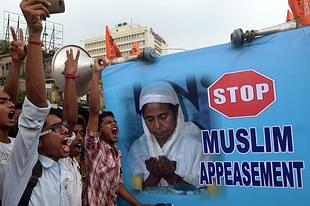Politics
Mamata's Delhi Visit Presents BJP With Chance To Show National Media The Perils Of India Turning Into A Bengal
Jaideep Mazumdar
Jul 17, 2021, 05:17 PM | Updated 05:17 PM IST
Save & read from anywhere!
Bookmark stories for easy access on any device or the Swarajya app.


Trinamool chief Mamata Banerjee is slated to visit the national capital and stay there for five days this month-end to lay the ground for creating a coalition of anti-BJP forces.
According to top Trinamool leaders, she is likely to meet Sonia Gandhi, leaders of the Shiromani Akali Dal (SAD), Samajwadi Party, DMK and NCP chief Sharad Pawar.
In the course of her six-day visit from July 25, she is slated to visit Parliament and meet prominent Opposition MPs. The entire objective is to lay the ground for a coming together of non-Congress opposition parties to take on the BJP in the 2024 Lok Sabha elections.
Mamata Banerjee has, for a long time, harboured ambitions of playing a major role at the national level and becoming the king-maker, if not occupying the top post herself.
The Trimamool’s spectacular sweep of the recently-held Assembly elections in Bengal has provided heft to her ‘national’ aspirations and ambitions, and catapulted her into the league of top anti-BJP opposition leaders.
But this is what also presents a precious opportunity to the BJP to puncture her ambitions.
That Mamata Banerjee is intolerant of criticism, dissent or opposition, uses the police and the state machinery to further her political objectives, displays strong dictatorial tendencies, and is mercurial is well-known to the citizenry of Bengal.
But not many outside Bengal know much about her and the damage she has done to the once-glorious state.
The Trinamool chief’s long stay in Delhi can provide the BJP with an opportunity to ‘expose’ her true face by highlighting Bengal’s post-poll violence — comprising the horrific attacks on BJP workers and supporters by Trinamool goons — at the national level.
The BJP, it is learnt, is already thinking on those lines and is planning to meet President Ram Nath Kovind to apprise him of the damning report of the National Human Rights Commission on the Bengal violence.
But it needs to raise the pitch and keep the nation’s attention focused on this issue during the entire duration of Banerjee’s stay in Delhi and even afterwards.
The BJP must take a cue from the NHRC's observation — that it is the law of the ruler and not the rule of law — that pervades Bengal, to educate the citizens of India about the possibly disastrous consequences of having a leader like Mamata playing a larger role in national affairs.
Mamata's Delhi visit presents BJP leaders an opportunity to showcase to the national media the perils of India turning into a Bengal, where democratic, civilised living is increasingly becoming a luxury, especially when India is looking towards better global branding and positioning vis-a-vis world affairs.
Role of media
The visit should, if BJP plays its cards right, serve as an occasion where Mamata Banerjee is held to account by the national media through aggressive questioning of the state of affairs in Bengal.
In Bengal, Mamata Banerjee is used to a subservient and docile media which never poses any tough questions to her, fearing retribution.
But the national media is on a different footing and should deconstruct her personality, given her national political ambitions and the ramifications it could have, in case she acquires greater electoral relevance.
Misgovernance
It's not post-poll violence alone that Mamata Banerjee should be held accountable for. Her sloppy economics, based largely on whim rather than logic, should also be a subject of serious debate — and the best man to discuss that is Ashok Lahiri, a noted economist from Bengal.
Lahiri, who was the chief economic adviser to the Government of India, is eminently placed to highlight the extremely sorry state of Bengal’s finances and how the Trinamool government has made a mess of it over the last decade — and the BJP could co-opt him into its fight against the Opposition.
In the times of global competitiveness, the BJP would do well to understand that it is the politics of economics — the art of exposing chinks in the adversary's fiscal philosophy — that is a real brahmastra in the quiver.
With the youth of today looking at wealth and growth as the real indicators of progress, the BJP could also train its guns on the Bengal CM for her dismal record in alleviating unemployment and inhibiting flight of talent from the state.
However, despite a host of valid issues on the table, only a well concerted campaign highlighting failures at all levels by the Opposition can put paid to the Trinamool chief's plans to stitch an alliance of non-BJP forces — if security of the nation and its ethos, according to the saffron party, is to be preserved.
Jaideep Mazumdar is an associate editor at Swarajya.





